Deniss Vasiļjevs: "Sport is a university of life"
January 22, 2023
By Anna Kellar
Photo © Reut Golinsky, Anna Kellar
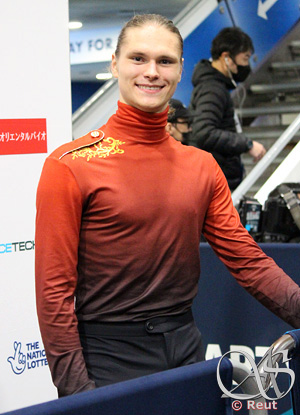 Deniss had a rocky start to his post-Olympic season, surprising many fans by placing 10th at Skate Canada. But two weeks later in Sheffield, Deniss showed up with a fresh outlook. He skated one of the best free skates of his career and won silver. It was his first Grand Prix medal, and the first senior Grand Prix medal ever won by a Latvian skater.
Deniss had a rocky start to his post-Olympic season, surprising many fans by placing 10th at Skate Canada. But two weeks later in Sheffield, Deniss showed up with a fresh outlook. He skated one of the best free skates of his career and won silver. It was his first Grand Prix medal, and the first senior Grand Prix medal ever won by a Latvian skater.
I spoke with Deniss after the rehearsals for the gala exhibition, and he was in a relaxed and contemplative mood. Deniss always has so many things on his mind - whether it be the books he is reading or analyzing his own performance. Here is a glimpse into the mind of this skating philosopher.
How did you celebrate yesterday? Did you get a good dinner?
It was late, so we went to "Five Guys." I had that big bacon burger, "all in".
That's not even a British restaurant! Did you get the English breakfast that you wanted to try this morning at least?
Yes. That was good. And the crisps (Deniss shared in the mixed zone that he had enjoyed trying the prawn crisps in the skaters' lounge -ed). For me, Britain will be always "Dr Pepper." That was the first soda [I had], and since "Dr Pepper" is so difficult to find, for me that will be always associated with here.
When did you first come to the UK?
I was a baby, not even in school yet. My father had to work here in order to support my figure skating career. He came when the European Union was open, and he worked outside of London. He was living here half the year at least, for a few years.
You said in the press conference that you read a book between Skate Canada and coming here. What did you read?
In Canada, I actually finished two full books. "Stillness is the Key," by Ryan Holiday, and "Practicing the Power of Now" (by Eckhart Tolle). Now I'm rereading "Ego is the Enemy," also by Ryan Holiday, because I really like it. I'm also waiting for The "Thirty-Three Strategies of War." I decided to make a biography of Ryan Holiday. He had quite an interesting career in "American Apparel." He has quite a few books on marketing, and I'm very interested in connecting more with people on social media, because I would like to share a bit more of my career.
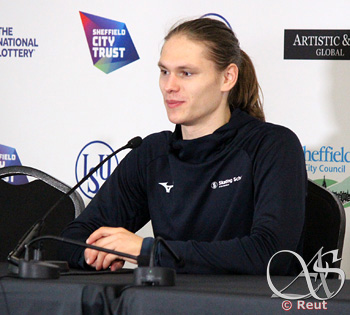 I think a lot of people would love that.
I think a lot of people would love that.
I'm curious what is his opinion on social media and how it works. I don't use the phone, so people are telling me: "Do something, post something!" Great! But they don't know I'm from the Stone Age.
If you get the chance you should talk to Maé Bérénice Meité. She finished her Master's in marketing, and she wants to work with skaters and athletes on their social media, so they aren't so dependent on federations for funding.
It's great that Maé tries to support [skating that way], but I still believe that considering how much effort and resources goes into figure skating, to maintain the ice rink and everything, it's good that its being supported at a national level... The effort that goes into our performance, from everyone, is much more than it appears. State support is the only way we can go. I don't know anyone who is skating on private funds, at least in Europe. It's all subsidized, it's a public service in a way. I think it's great, that we're not free like in tennis, but we have certain commitments toward the state or institutions. It grounds us a bit, we feel we belong somewhere. Particularly as a skater that is not in his hometown, far from it, still in my thoughts there is quite a bit of connection with where I come from.
The question of how to fund a skating career can be complicated, and people don't talk about it very much, maybe because people don't like to talk about money.
What I don't like, when people talk about money, is they forget what the money represents.
Here Deniss paused to think for a minute, and then began to describe his view of figure skating as an art, sport, and entertainment - and the time and dedication it takes to develop each aspect.
 I feel sport... has become something that you can just see on a scoreboard, and you are satisfied. It's not something that brings people in as much as it used to, to come and watch and admire something different, or simply to share [the emotions]. My own thought about skating is that it is first and foremost an entertainment, you want to bring something of yourself, and if you fail completely, it's fine, it's part of the process. That's what makes the career interesting. You don't want to expect the same thing over and over again, because then it becomes repetitive and boring.
I feel sport... has become something that you can just see on a scoreboard, and you are satisfied. It's not something that brings people in as much as it used to, to come and watch and admire something different, or simply to share [the emotions]. My own thought about skating is that it is first and foremost an entertainment, you want to bring something of yourself, and if you fail completely, it's fine, it's part of the process. That's what makes the career interesting. You don't want to expect the same thing over and over again, because then it becomes repetitive and boring.
Today we've developed and understand the technique so well that it has become the dominant thing. But it can't take over the part that is way more difficult to judge and understand, that is very personal, that takes time for the character of a person who skates to develop. The artistic side that makes [the sport] so different is also its strength. In a way, modern day figure skating kills it. Because flashy things like jumps require you to be the sharpest, most precise, and yet this precision makes it mechanical, and the whole world is mechanical. [But] it's the flip side of the skating, that makes people ... like here, they stood up for skating.
(Deniss commented in the press conference that the standing ovation he received after his free skate was more valuable to him than his medal).
I feel jumps are like a piece of furniture. You make it, it gets dusty, and you clean it up, but it's dead. Skating is more like a growing tree. It takes way more patience, way more care. It takes an input of resources that are low but constant in order to develop into something. And it's something that starts from a very young age.
I see this balance between the sides of figure skating, the artistic and athletic, and I wish it could be a little bit more balanced out. 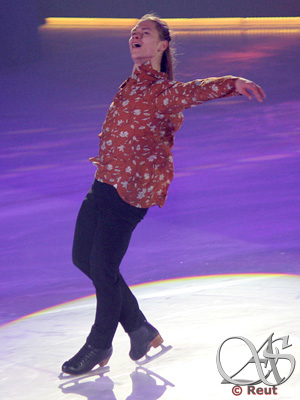 Or at least that the system itself could separate the [role of the judge and the] opinion of the technical controller, because a jump might appear beautiful, even if it had a mistake. The judge should still judge whatever he sees and not be restricted entirely from putting [positive GOE] on a jump that looks good with a mistake. Then we could play with percentages - okay, you make a mistake, down thirty percent of the value. But the judge should still be able to say his opinion, express himself.
Or at least that the system itself could separate the [role of the judge and the] opinion of the technical controller, because a jump might appear beautiful, even if it had a mistake. The judge should still judge whatever he sees and not be restricted entirely from putting [positive GOE] on a jump that looks good with a mistake. Then we could play with percentages - okay, you make a mistake, down thirty percent of the value. But the judge should still be able to say his opinion, express himself.
Now we have simplified the components from five to three. In a way, I like that simplicity from a pragmatic point of view. But honestly, [the difference between the components] doesn't represent anything. Because there are people that are so charismatic, but they struggle to skate. And then there are people that are amazing at skating, but they are very shy.
My understanding is that the goal of the three components was to make it easier to distinguish between those strengths. You don't see it happening?
It's something that needs to be developed as a culture among judges. It takes a lot of education to comprehend... an education that is more art-based, with appreciation of the character of a skater, respect for difficulty in execution... It's a much harder topic to grasp, but it must be explored if figure skating is to maintain, and balance out, its struggle of being between sport and entertainment.
I have moved a little bit away from the conventional thought of medals, of achievement, and I just enjoy the life the way I live it. I get passionate about what I skate, I get energized. I have plenty of terrible days, and I have to manage my own emotions. Figure skating shapes me in a way I never expected. There are a lot of difficulties, obstacles you go through in daily life, and it makes you mentally fortified for the world beyond the sport. These are skills that you are not taught in schools, skills that you acquire with experience going through the life, and we are very fortunate that we get some of those things.
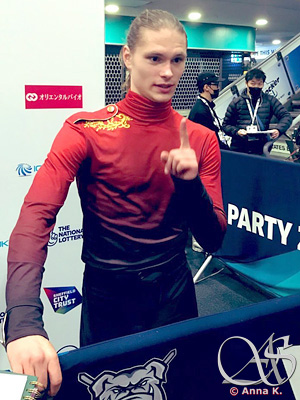 There is lot of pressure and endurance and mental fortitude, already at a young age. Many break [under the pressure] - you're in or you're out. Particularly in my younger experience with Russians, so many great people were broken. Today [the mental aspect of the sport] starts to be addressed much more, which is great, but there are definitely more ways to improve it. Perhaps I don't see the way, but I can observe, and awareness is the first step in change.
There is lot of pressure and endurance and mental fortitude, already at a young age. Many break [under the pressure] - you're in or you're out. Particularly in my younger experience with Russians, so many great people were broken. Today [the mental aspect of the sport] starts to be addressed much more, which is great, but there are definitely more ways to improve it. Perhaps I don't see the way, but I can observe, and awareness is the first step in change.
There should be more options, I think, to value skaters beyond the environment of elite competition.
I understand what you are talking about, but that's more like the leisure sport - it shapes you, but we're not nearly talking about the same type of performance. Here, we are trying to be like Formula 1 in a way. We're trying to assess everything, manage it in such a manner that you require a whole team. So that the fancy horses that we are (Deniss pointed at himself and laughed) we do our job to the best of our abilities when it matters. It's a combined project of the team, and that is what makes it not comparable [with more casual skating].
For me, the most difficult thing in the sport is to find the right people for the right job. I'm very fortunate to be in Switzerland and have so many good people around, but the path [to this success], so many people don't make it. It [elite performance] requires a lot of support, not only financial, but in others offering their talents, offering trips for studies, offering specialists to go around and give advice. That would boost the culture. Because in the end figure skating... is an identity. It's not just a sport, do whatever you want, here's the rules, go.
That's why I appreciate philosophy so much because I always tend to look not down the river, but up towards the source. My studies and understanding of where the virtues come from and values develop, is always somehow walking backward. We need to study history; we need to study the source.
If you had to give advice to yourself as a younger person, with all the paths you have taken, do you think you would do things differently?
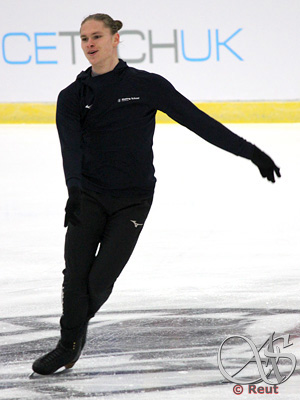 Yes. I had my path, I had my challenges, and a lot of things I have learned only recently. One thing is the conservation of the energy. Like Winston Churchill said: "Never stand up when you can sit down, never sit down when you can lie down." I had this injury that pretty much ended the career of my coach, ended the career of my ex-coach, and I was almost done before I started seniors (both Deniss and coach Stéphane Lambiel suffered from a torn adductor muscle - ed). It was from overwork. It was because there was zeal, but there wasn't the direction, and the study in body performance was so low.
Yes. I had my path, I had my challenges, and a lot of things I have learned only recently. One thing is the conservation of the energy. Like Winston Churchill said: "Never stand up when you can sit down, never sit down when you can lie down." I had this injury that pretty much ended the career of my coach, ended the career of my ex-coach, and I was almost done before I started seniors (both Deniss and coach Stéphane Lambiel suffered from a torn adductor muscle - ed). It was from overwork. It was because there was zeal, but there wasn't the direction, and the study in body performance was so low.
I discovered discipline only when I moved to Switzerland, and then when I lived pretty much on my own. Self-discipline is a very valuable skill because we try to run as fast as we can, rushing forward, we tend to neglect important things. I think it was MacArthur who said that although we all wish for freedom, we don't understand what it is, and how much self-discipline it requires for it not to become an anarchy. And this intelligence comes from experience. You have to push yourself beyond your comfort zone. You can't just read it in a book or be told it in a school.
I know this because I didn't have the luxury of being every day in a school, so I really valued it. Every time I was there, I was soaking it up like a sponge, I was analyzing everything the teacher said. I was forced to do my homework before I did anything else I valued. In general, modern education tends to be under appreciated because it's just there for the taking. There is so much information around, but shaping it and using it, requires maturity. I think sport teaches a lot, if you wish to survive and endure and learn also certain morals, particularly avoiding your ego or dealing with it. It's a different lifestyle, it's not like getting a degree in university, but sport is, in fact, a university of life.
Skating has led you to have many experiences that are different than most people your age.
Most of the time I struggled to understand my peers, particularly in school. Because I ended up not matching their interests, and of course, my communication skills were not there, because I didn't have so much exposure. 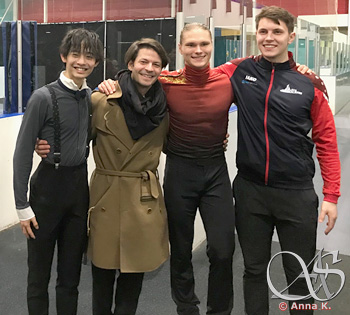 I was more with my own thoughts on the ice, or in a book. So, my teachers were the people who wrote the books, and their thoughts and philosophies that I was forced to digest. Because I had such a different approach, I struggled to connect. Like with the phone, I was forced to have it, I'm glad to have it, but I can forget to charge it. If I didn't have it, I'd have a CD player to play music, because that's pretty much all I use it for. I save a lot of money and time avoiding the distractions that knock me off my course, but it's because I have a big priority towards figure skating, and now my studies.
I was more with my own thoughts on the ice, or in a book. So, my teachers were the people who wrote the books, and their thoughts and philosophies that I was forced to digest. Because I had such a different approach, I struggled to connect. Like with the phone, I was forced to have it, I'm glad to have it, but I can forget to charge it. If I didn't have it, I'd have a CD player to play music, because that's pretty much all I use it for. I save a lot of money and time avoiding the distractions that knock me off my course, but it's because I have a big priority towards figure skating, and now my studies.
Lately I deeply value solitude, where you can go inside [yourself] and try to organize your thoughts, instead of constantly seeking what is outside. Meditation is probably one of the biggest examples. Ask someone to calm himself for one minute, it will be a disaster. After focusing for five minutes, just breathing, the mind will wander, but after thirty minutes of reaching you feel this vibration inside of you, and every piece of the body starts to move on its own accord, something that is difficult to comprehend at first. It's not that every single time that you are focused for thirty minutes, you sink into this [state], sometimes it doesn't [happen], but studying your own body and your own mind... it is hard to say scientifically, but it does somehow express itself in the world.
You have yourself as the trial subject of your studies.
It's pretty much the life of sport: exploring yourself, understanding, being objective, mixing between rational and emotional, and trying to cultivate the mental discipline, this focused energy, that you don't want to waste. There are many things to improve, and I can say from experience it is very difficult to start, because there is no template that you can say for sure will work for you. It's a personal journey, and something everyone must do for himself. 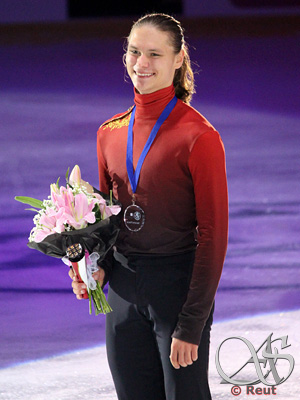 It's not physics, gravity that for sure will make things fall. It's something that is more maze-like but understanding offers so much wealth within.
It's not physics, gravity that for sure will make things fall. It's something that is more maze-like but understanding offers so much wealth within.
Now I am particular about ego. It has driven me to the sport where I am, yet it is the times when I can manage to avoid... not avoid ego, but find humility, that it actually benefits me more.
When you are fully absorbed in something, or you are fully present, you don't worry about what others are thinking about you, there is less focus on ego.
Let's say there are different ways. There are times when you are super focused, and there are times when you flow through any idea that comes, you don't grasp at it. The mystery of the mind is still fresh to me. But I know that in the best performances, I live in the moment. I don't recall anything except certain pieces of it when I exit it. It is so difficult to maintain the flow. It is something that takes a lot of time to master, and I am very far from mastery, or even understanding what it is. I'm kind of shooting in the dark half of the time, more than half of the time.
What are you doing your Master's degree in?
Leadership and organization. Management for a leading position, like if I want to become a CEO.
This is also remote in Latvia?
I'm being very well supported by them with flexibility in when I want to do the work. Just the point is to do it and manage the volume of work.
Did you always plan to continue with your education?
Yes, the moment I finished my bachelor's degree, they offered me a great deal. I thought about it, and decided to go with it.

We wish Deniss success in all his endeavors, on and off the ice!



